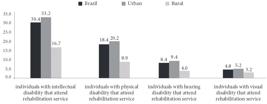Abstract
Objective
To describe the self-reported prevalence of intellectual disability, physical, hearing and visual, according to sociodemographic variables, degree of limitation and frequency of rehabilitation service use.
Methods
Data from the National Health Survey, a population survey. the self-reported prevalence of physical, mental, visual and hearing were calculated and their 95% confidence intervals, stratified by sex, age, race / color, for Brazil, place of residence and Major Regions.
Results
The prevalence of self-reported disability in the country was 6.2% (12.4 million people). The prevalence of disability was 1.3% higher in men, in people aged 60 or more in the Northeast. Visual impairment was more prevalent (3.6%), increased with age, as well as hearing loss. Acquired deficiency was higher in relation to the birth (except intellectual). Lesser degree of limitation was observed among those who reported visual impairment and the use of health services was less frequent.
Conclusion
It is necessary to expand access to health promotion, early diagnosis and treatment, as well as strengthen public policies aimed at this population.
Disabled persons; Self report; Health surveys; Health inequalities

 Thumbnail
Thumbnail
 Thumbnail
Thumbnail
 Thumbnail
Thumbnail




